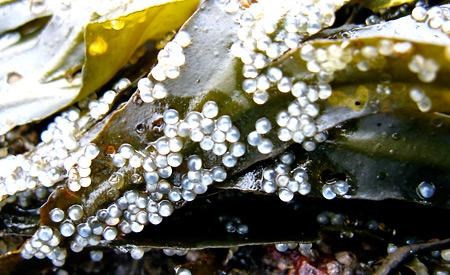An environmental group is asking Powell River gardeners to consider alternatives to using seaweed for their gardens.
“By being aware of what you’re doing and taking care, we can make a big difference,” said Dianne Sanford who volunteers with Friends of Forage Fish, an environmental group on the Lower Sunshine Coast. The group scours Sunshine Coast beaches searching for the presence of forage fish eggs and raises awareness about forage fish as the cornerstone of the marine food web.
Herring is a forage fish and is among the most important fish in the sea, connecting food energy from the smallest zooplankton to predatory fish like salmon, lingcod and large mammals such as sea lions and orca.
Sanford wants to remind gardeners that the months of February and March are herring spawning months and the fish will often choose seaweed as an anchor for its eggs. Herring eggs are small at about 1 to 1.5 millimetres in diameter.
Even when the seaweed breaks off and washes ashore, herring eggs can survive until the next high tide. By taking the seaweed, people risk destroying thousands of herring eggs.
“Anything that’s a detriment to the seaweed is going to have an effect on the herring,” she said. “It’s the cumulative effect of us all; there’s a lot of us in the world now.”
On the east coast of Vancouver Island, beginning in 2012, the ministry of agriculture has given out five licences to harvest seaweed.
“The combined harvest will take tonnes of the stuff.” Sanford recommends that gardeners don’t take any seaweed off the beach during the spawning season and instead opt for other materials for garden mulch and fertilizer.
“There are many other materials which make good mulch and give the soil nutrition,” she said. Alternatives include anything organic that will break down, like sawdust, down from old quilts, grass clippings, leaves, compost and biodegradable packing peanuts.
Outside of herring spawning season, Sanford recommends taking only small amounts of seaweed for the garden.
“Seaweed is a nice mulch to use and people have historically used it for their gardens,” she said, “but because there are more people on the Sunshine Coast, the impact is significant.”
For more information about Friends of Forage Fish or to volunteer, readers can contact Sanford at 1.604.885.6283, email her at [email protected] or visit the group’s website.



